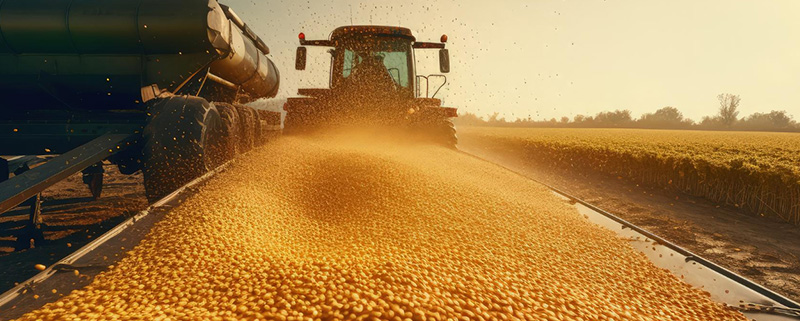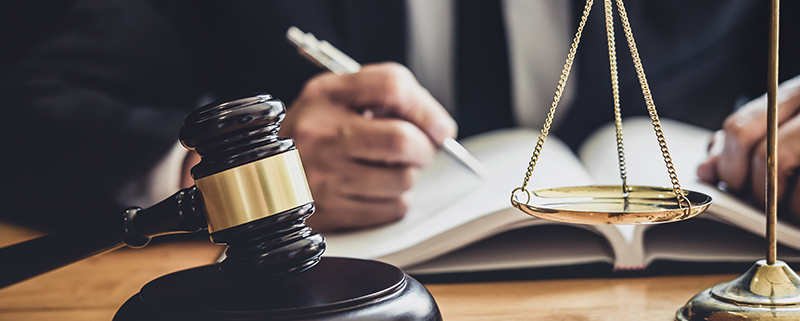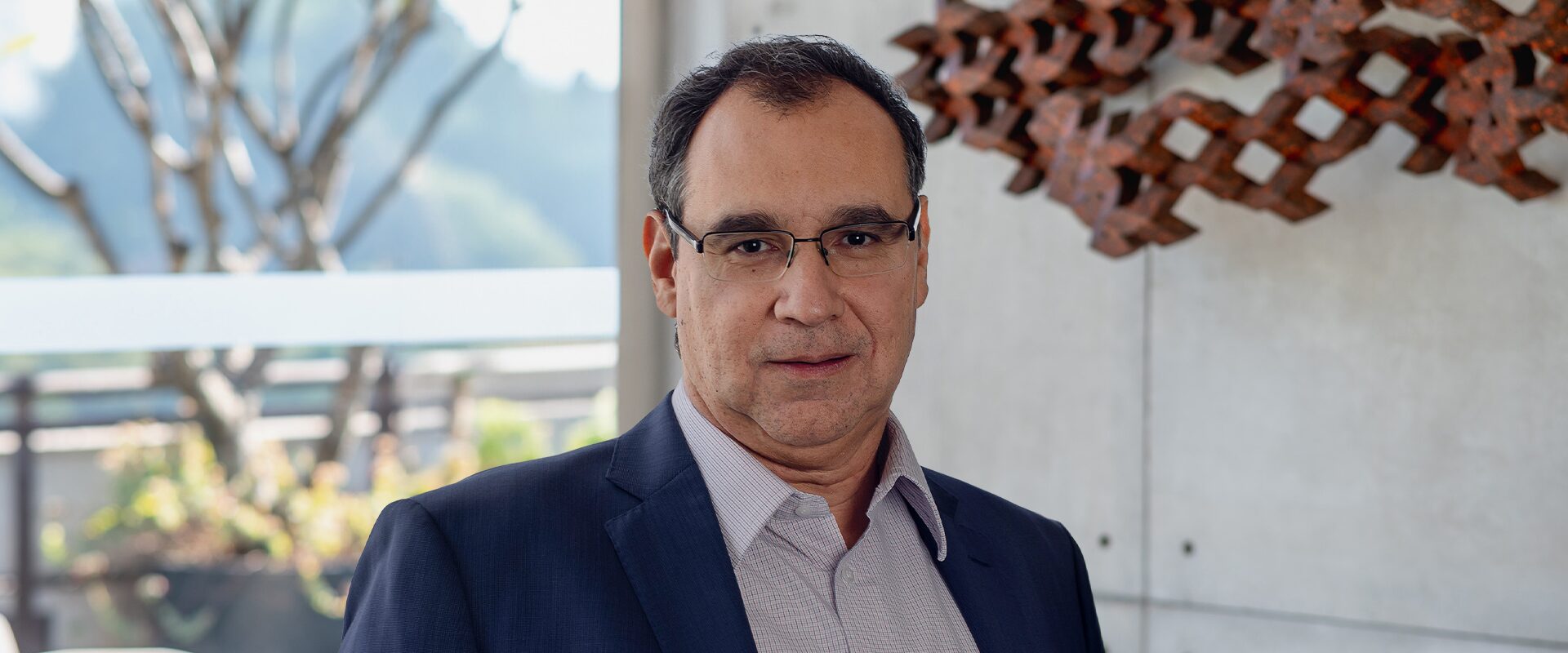
The Agribusiness Newsletter brings information and news about the main regulations and legal texts relating to the regulation of agribusiness in Brazil. This initiative seeks to cover the agribusiness industry on its transactional, litigation, tax and regulatory levels, and is an invitation for all of those working in this market to both access important news and comments on vital topics from the sector.
This material is for informative purposes only, and should not be used for decision-making. Specific legal advice can be provided by our legal team.
NEWS

Federal Revenue Service operation can increase inspections of individual rural producers
Brazil’s Federal Revenue Service has launched the third phase of Operation Dagon, aimed at combating tax evasion (especially income tax) by individual rural producers.
The operation seeks to dismantle fraudulent schemes, currently focused on the central region of Brazil (especially in Goiás and Bahia), which use false invoices issued by “noteiras” (so-called ” shell companies” that issue false electronic invoices for the sale of agricultural inputs).
Despite the specific scope of the operation, lateral fines may arise as a result of the increase in the number of inspections of rural producers in the central region and other regions of Brazil. As a result, agribusiness taxpayers must constantly maintain tax compliance.
Federal Revenue Service’s annual planning outlines specific measures for the agribusiness sector
Through its Annual Inspection Planning for 2024, the Federal Revenue Service described the results achieved in 2023 and the plans for 2024 regarding its tax control and collection activities.
As for 2024, the Federal Revenue Service lists in its report the measures it intends to implement to encourage compliance with tax obligations, categorized into measures:
- structuring (aimed at improving the areas of inspection and interaction with taxpayers);
- facilitating (aimed at assisting taxpayers in complying with their tax obligations);
- assisting (aimed at providing guidance to taxpayers); and
- coercive control (covering inspections).
The Federal Revenue Service states that it will deepen its analysis of the compliance risks of taxpayers known as “special differentiated”, considering their significant role in federal tax collection, including, among other sectors, the agricultural sector (production and trading). In parallel, the Federal Revenue Service has also indicated that it will continue to provide assistance to remedy the main tax violations identified by rural producers, such as the failure to submit the Individual Income Tax Return (“DIRPF”) or the Rural Producer’s Digital Cash Book; the failure to properly tax income from leases; and the reduction of taxable income from rural activities through the use of non-deductible expenses.
The Federal Revenue Service has also included important topics in its inspection plan, such as the effects of the new rules on transfer pricing, interest on equity, investment funds, the adoption of the eSocial tax return as of 2025 (a replacement for the DIRF), the misappropriation of PIS/Cofins tax credits and undue exclusions relating to the Lei do Bem (“Law of Good”).
Brazilian Securities and Exchange Commission postpones adaptation to the next Resolution 175 framework
The investment fund sector has been granted an extension to the deadline for complying with CVM Resolution 175 of December 13, 2022.
The Securities and Exchange Commission (“CVM”) has extended the implementation of the next stage of the regulation, dividing its compliance into three phases. The application of the structure of categories and subclasses has been postponed until October 01, 2024, while the introduction of the segregation of charges between service providers can be carried out until November 01, 2024.
In turn, the adaptation period for the inventory of Credit Rights Investment Funds (“FIDC”) was extended to November 29, 2024. This decision was taken after the Brazilian Financial and Capital Markets Association (“ANBIMA”) requested the extension at the end of 2023. “We submitted this request because of the major changes that impacted our teams simultaneously: CVM Resolution 175 and the new tax legislation for closed-end funds, both of which are quite complex,” explained Pedro Rudge, vice-president of ANBIMA. “The extra time granted by the CVM will provide fund service providers with more security to implement the necessary changes with ease,” he said.
The deadline for the entire sector to adapt to CVM Resolution 175 was also changed, from December 31, 2024, to June 30, 2025. By this date, the entire inventory of Financial Investment Funds (“FIFs”) must comply with the regulation.
The CVM also took the opportunity to make other adjustments, specifically amending Annex III of CVM Resolution 175, which now allows the creation of real charges on real estate in the portfolio. All these changes took place following the enactment of CVM Resolution 200 of March 12, 2024, which amended CVM Resolution 175.
In addition, one of the most eagerly awaited annexes to CVM Resolution 175 refers to the regulation of Investment Fund in Agroindustrial Productive Chains (“FIAGRO”). Through a public consultation that was concluded on January 31, 2024, the CVM discussed the new Fiagro rules, which will be integrated into Normative Annex VI of CVM Resolution 175. Thus, despite the progress made, the market is still anxiously awaiting the next regulatory steps.
For more information, access the full article: CVM postpones adaptation to the next Resolution 175 framework.
FIAGRO industry grows ten times more than market average in one year
On April 01, 2024, the CVM Agribusiness Newsletter highlighted the significant growth of the Investment Fund in Agroindustrial Productive Chains (“FIAGRO”) and Agribusiness Receivables Certificate (“CRA”) markets.
The FIAGRO market has grown 103% since December 2022, reaching a net worth of BRL 21.3 billion in December 2023, while the CRA market grew 35.8%, reaching BRL 130 billion in the same period.
he CVM is focused on reinforcing the presence of agribusiness in the capital markets, including proposals for specific regulations for FIAGRO. The CVM seeks to modernize the FIAGRO industry, recognizing its importance for Brazil’s economic development.
The newsletter also highlights the existence of an interactive dashboard for monitoring market developments and details on FIAGRO and CRA.
For more information, access the full article: FIAGRO industry grows ten times more than market average in one year.
AGRO IN THE MEDIA

Purchase and lease of rural property by foreigners: what to expect from the STF judgment?
The Brazilian and international markets eagerly await the decision of the Federal Supreme Court (“STF”) in Claim of Non-Compliance with a Fundamental Precept (“ADPF”) 342, which could significantly influence foreign investment in the agricultural sector and, consequently, in the Brazilian economy.
REGULATION

TAX REGULATION
Federal Revenue Service states that the sale of rural property by a taxpayer subject to presumed profit is subject to the calculation of capital gains
Through Normative Instruction No. 25/2024, the Federal Revenue Service stated that taxpayers subject to presumed profit who sell rural property previously used in livestock activities must submit the positive difference recorded in the transaction to the calculation and taxation of the capital gain – and not to presumed percentages specific to this regime.
Even if the legal entity’s corporate purpose includes the “purchase and sale of owned real estate”, it is understood that the specific regulation that determines the use of the declared Bare Land Value (“VTN”) as a parameter for calculating capital gains (article 19 of Law No. 9,393/96) prevents the gross revenue from the transaction from being subject to presumed revenue percentages of the presumed profit.
In practical terms, the position of the Federal Revenue Service is that capital gains earned in accordance with the regulation above (VTN) will be subject to a heavier tax rate, which may vary depending on the nature of the income (gross income from real estate activities or non-operating income from the sale of assets). However, this position by the tax authorities can be questioned depending on the specific characteristics of the transaction and the taxpayer.
For more information, access: COSIT CONSULTATION SOLUTION NO. 25, OF MARCH 14, 2024
Executive Branch presents proposal to regulate tax reform
On April 25, 2024, the Executive Branch presented Supplementary Bill No. 68/2024 (PLP 68/24) to regulate Constitutional Amendment No. 132/2023, which approved the tax reform on consumption.
The bill covers the general provisions and information on the Goods and Services Tax (“IBS”), the Goods and Services Contribution (“CBS”) and the Selective Tax (“IS”).
As informed by the Federal Government, a second bill will be presented to regulate the management and administration of the new system and to address the organization of the IBS Management Committee, the administrative litigation, the distribution of revenue among the federative entities, and the reimbursement of ICMS credit balances.
Among the main proposals, we briefly highlight the following:
| Taxable event for IBS and CBS:
The taxes will be levied on onerous transactions with tangible or intangible goods and services in general, as well as on non-onerous transactions expressly provided for in the bill. |
Calculation basis:
The calculation basis will be the value of the transaction, i.e. the amount charged by the supplier in any capacity, including additions, interest, fines, charges, conditional discounts, transportation as part of the value of the transaction, taxes and public prices, including tariffs, and all amounts charged or received as part of the value of the transaction, including insurance and fees. |
| Noncumulative regime:
The taxpayer can record IBS and CBS credits when payment is made (including through compensation) in the preceding transactions, except for goods for personal use and consumption, as specified in the bill. |
Rates:
Although not provided for in the bill, the rates are now estimated by the Ministry of Finance at 8.8% for CBS and 17.7% for IBS, totaling 26.5%. These rates will be set by a specific law of each federal entity, which will individually set its own rate, to be considered the standard rate for transactions with goods and services in that locality. |
In addition to the general aspects of the IBS and CBS tax regulations, the Bill also provides information on:
| The personalized refund of IBS and CBS (cashback) and the national staple food basket. | The reduction of tax rates (by 30%, 60% and 100%) and the granting of presumed IBS and CBS credits. | Specific regimes (such as fuel, financial services, health insurance and real estate, for example). |
| Tax administration, involving inspection and assessment. | Rules for transition between regimes. | General information on the levying of selective tax. |
| The treatment to be applied to PIS and Cofins credits, including presumed credits. | Other provisions on topics such as the Manaus Free Trade Zone and Free Trade Areas, the reduction of the IPI to zero as of 2027, and compensation between the IPI and selective tax regimes. | |
A number of regulatory bills have also been presented in parallel by the House of Representatives, among which we highlight the following topics:
- Simplified taxation system (Simples Nacional) and special or simplified regimes in the case of IBS and CBS – PLP 07/2024;
- Selective Tax – PLP 29/2024;
- Administrative contracts – PLP 33/2024;
- National Staple Food Basket – PLP 35/2024;
- IBS and CBS Administrative Litigation – PLP 37/2024;
- Fuels – PLP 43/2024;
- Differentiated regimes – PLP 48/2024 and 58/2024;
- IBS and CBS neutrality – PLP 49/2024;
- IBS/CBS regulation – PLP 50/2024;
- Manaus Free Trade Zone – PLP 51/2024;
- Import and Special Customs Procedures – PLP 53/2024;
- Financial Services and Healthcare Plans – PLP 52 and 54/2024;
- Specific regime – Real Estate – PLP 55 and 60/2024;
For the agribusiness sector, it is worth noting that PLP 68/24 regulates in detail goods considered harmful to health and the environment (including vehicles, extracted mineral goods, aircraft and boats, smoking products and alcoholic beverages) and the matrix regulation of the selective tax (such as the definition of the taxable event, calculation base, taxpayer, etc.).
The Executive Branch has confirmed in PLP 68/24 that differentiated regimes, subject to a 60% reduction in the rate, will not be subject to IS (which includes agricultural inputs and products).
On this subject, PLP 29/2024, presented by the House of Representatives, states that another supplementary law must specify the products and services that would be subject to this tax. This bill also provides that the IS will not be levied on products and services that are derived from or have in their composition goods or services with a reduced rate, or that are part of the production chain of goods and services that are exempt from the tax. In PLP 68/24, presented by the Executive Branch, there is no mention of this possibility.
The text of PLP 68/2024 submitted to the House of Representatives will be analyzed by the appropriate committees and voted on by the plenary in two rounds. Approval of the bill requires an absolute majority of votes (257 out of 513).
The vote is expected to take place before the congress recess, which will begin on July 17, 2024. Once approved, the bill will be submitted to the Senate, which will vote on it in a single round. Finally, the bill will advance for presidential sanction or veto.
FINANCIAL REGULATION
CMN amends regulation on eligible backing for issuance of CRI and CRA
The National Monetary Council (“CMN”), during an extraordinary meeting, amended CMN Resolution No. 5,118, of February 01, 2024, which addresses backing for Agribusiness Receivables Certificates (“CRA”) and Real Estate Receivables Certificates (“CRI”).
The new CMN Resolution No. 5,121, of March 01, 2024, allows the use of commercial contracts, such as trade bills and lease agreements, as backing. In addition, agribusiness and real estate companies with no direct connection to financial institutions can carry out securitization operations.
Since early 2024, the CMN has been making important changes to the securitization market, improving the regulations applicable to CRA and CRI. As a result, the industry will have to adapt to the new regulatory scope.
For more information, access the full article: CMN amends regulation on eligible backing for issuance of CRI and CRA.
CVM REGULATION
CVM publishes Circular Letter No. 2/2024/CVM/SRE with new guidelines on receivables certificates
On April 12, 2024, the CVM’s Superintendence of Securities Registration (“SRE”) published Circular Letter No. 2/2024/CVM/SRE, which complements previous guidelines on procedures for the automatic registration of public offerings for the distribution of securities, specifically for senior class series of receivables certificates.
The circular letter highlights:
- The need to make a distinction between series within the same senior class, as provided for in the regulations, and the importance of treating subsequent offerings as series reopenings.
- The timing of the offerings and the need to separate the series appropriately to ensure compliance with CVM Resolution 160 of July 13, 2022. Thus, if the offeror intends to carry out subsequent offerings of a certain senior class series of the same issue of receivables certificates, with different opening, closing and settlement dates, each offering should be addressed separately (separate series reopening offerings), with its own application for registration.
The document reinforces the importance of specific consultations with the Offering Registration System through the e-mail suporte-sistemasre@cvm.gov.br, in the event of doubts by the offeror or other parties involved in the offering, in order to duly comply with CVM Resolution 160 and other applicable regulations.
For more information, Access the CVM’s webpage.
ENVIRONMENTAL REGULATION
Forestry
— Federal
House of representatives approves bill that reduces environmental protection in ‘non-forest areas’
On March 20, 2024, the Constitution and Justice Committee of the House of Representatives approved Bill No. 364/2019, which provides for the use and protection of native vegetation in altitude fields (located in specified altitude ranges) associated with or covered by the Atlantic Forest Biome. As the bill is final, it will not have to be discussed by the Plenary and will be submitted directly to the Senate.
The cutting, suppression and exploitation of vegetation in the Altitude Fields associated with or covered by the Atlantic Forest Biome will be carried out in a different manner, depending on whether it is primary or secondary vegetation, taking into account the stage of regeneration in the case of secondary vegetation.
For more information, access: PL 364/2019.
Ministry of the Environment and Climate Change creates program to support municipalities in controlling and reducing deforestation and forest degradation in the Amazon Biome
On April 04, 2024, the Ministry of the Environment and Climate Change published GM/MMA Ordinance No. 1,030/2024, which provides for the Federal Government and Municipalities Program to Reduce Deforestation and Forest Fires and creates the Federal Government and Municipalities Commission.
According to the ordinance, municipalities located in the Amazon Biome can join the Federal Government Program, and are considered a priority for efforts to prevent, monitor, control and reduce deforestation and forest degradation, as defined by Article 2 of Decree No. 11,687/2023 – which regulates deforestation in the Amazon Biome.
Municipalities that join the program can be given priority in Federal Government efforts relating to:
-
- supporting environmental and land regularization;
- analyzing clearance requests submitted to Brazilian Institute of Environment and Renewable Natural Resources (“IBAMA”) and the Chico Mendes Institute; and
- encouraging native vegetation recovery, among other actions.
For more information, access: GM/MMA Ordinance No. 1.030/2024, of April 03, 2024.
Ministry of the Environment and Climate Change declares state of environmental emergency due to risk of forest fires in various seasons and regions of Brazil
On April 29, 2024, the Ministry of the Environment and Climate Change published GM/MMA Ordinance No. 1.052/2024, declaring a state of environmental emergency in connection with the risk of forest fires in specific seasons and regions of Brazil.
The ordinance lists the emergency regions, considering the periods between the months of:
-
- February to September 2024:
- Mesoregions of the state of Pará: Western Center of Paraná and Northwest of Paraná
- Mesoregions of the state of Rio Grande do Sul: Western Center of Rio Grande do Sul and Metropolitan Area of the city of Porto Alegre
- February to September 2024:
-
- March to October 2024:
- Mesoregions of the state of Minas Gerais: Center of Minas Gerais, Northwest of Minas Gerais, South/Southeast of Minas Gerais and the Triângulo Mineiro (Minas Triangle)/Alto Paranaíba regions
- Mesoregions of the state of Mato Grosso do Sul: Northern Center of Mato Grosso do Sul and Eastern Mato Grosso do Sul
- Mesoregions of the state of Paraná: Eastern center of Paraná, Central north of Paraná, Pioneer north of Paraná, West of Paraná and Southwest of Paraná
- Mesoregions of the state of Rio Grande do Sul: Eastern Center of Rio Grande do Sul, Northeastern Rio Grande do Sul and Southeastern Rio Grande do Sul;
- Mesoregions of the state of São Paulo: City of São José do Rio Preto and the Paraíba Paulista Valley
- March to October 2024:
-
- April to November 2024:
- The state of Acre
- Southern Amazon mesoregion in the state of Amazonas
- Mesoregions of the state of Bahia: Far West of Bahia and the São Franciscano Valley of Bahia
- Federal District
- Goiás
- Mesoregions of the state of Minas Gerais: Jequitinhonha, Metropolitan area of Belo Horizonte, North of Minas Gerais, West of Minas Gerias, Mucuri Valley, Rio Doce Valley and Zona da Mata region; Campo das Vertentes
- Mesoregions of the state of Mato Grosso: Southwest of Mato Grosso, Northeast of Mato Grosso, Southeast of Mato Grosso and North of Mato Grosso.
- Metropolitan Mesoregion of the city of Curitiba in the state of Paraná
- Southeast Mesoregion of the state of Piauí
- Rio de Janeiro
- Northwest Mesoregion of the state of Rio Grande do Sul
- Tocantins
- April to November 2024:
-
- May to December 2024:
- Northern Mesoregion of the state of Amapá
- Mesoregions of the state of Amazonas: Center of Amazonas and Southwest of Amazonas
- Mesoregion of the state of Bahia: São Franciscano Valley in the state of Bahia
- Jaguaribe Mesoregion in the state of Ceará
- e) Mesoregions of the state of Mato Grosso do Sul: Wetlands of Mato Grosso do Sul and Southwest of Mato Grosso do Sul
- Mesoregions of the state of Maranhão: Center of Maranhão, East of Maranhão, North of Maranhão and South of Maranhão
- Center-South Mesoregion of the state of Mato Grosso
- Mesoregions of the state of Pará: Lower Amazonas, Marajá, Northeast of Pará, Southeast of Pará and Southwest of Pará
- Mesoregion of the state of Paraná: Center-South of Paraná
- Mesoregion of the state of Piauí: Center-North of Piauí, North of Piauí and Southwest of Piauí
- Southwest Mesoregion of the state of Rio Grande do Sul
- Mesoregions of the state of Rondônia: East of Rondônia and Madeira-Guaporé
- Federal District
- May to December 2024:
-
- June 2024 to January 2025:
- Southern Mesoregion of the state of Amapá
- Mesoregions of the state of Bahia: Center-North of Bahia and Center-South of Bahia
- Mesoregions of the state of Ceará: Center-South of Ceará, Metropolitan area of the city of Fortaleza, North of Ceará, Hinterlands of Ceará and South of Ceará
- West Mesoregion of the state of Maranhão
- Mesoregions of the Metropolitan area of the city of Belém and Northeast of the state of Pará
- Mesoregions of the state of Pernambuco: Hinterlands of Pernambuco and the São Francisco area of Pernambuco
- Mesoregions of the state of São Paulo: Cities of Bauru, Campinas, ltapetininga, South Coast of São Paulo, Metropolitan area of São Paulo, cities of Araçatuba, Araraquara, Assis, the Main Metropolitan area of São Paulo, cities of Marília, Piracicaba, Presidente Prudente and Ribeirão Preto
- June 2024 to January 2025:
-
- July 2024 to February 2025:
- North Mesoregion of the state of Amazonas
- Northwest Mesoregion of the state of Ceará
- Mesoregion of the Metropolitan area of the city of Recife in the state of Pernambuco
- July 2024 to February 2025:
-
- August 2024 to March 2025: Pernambuco and the mesoregion of Mata Pernambucana.
- September 2024 to April 2025:
- Mesoregions of the state of Bahia: Metropolitan area of the city of Salvador, Northeast of Bahia and South of Bahia
- The Agreste Mesoregion of the state of Pernambuco
- Roraima
For more information, see GM/MMA Ordinance No. 1,052, of April 25, 2024
Federal decree provides for the incorporation of rural properties within the scope of agrarian reform
On April 16, 2024, the Federal Government published Decree No. 11.995, which established the Terra da Gente (Land of the People) Program and provided for the incorporation of rural properties within the scope of the National Agrarian Reform Policy.
The Terra da Gente Program aims to provide legal alternatives for acquiring and making land available for agrarian reform.
According to the decree, some of the methods for obtaining rural properties for the purposes of agrarian reform will be:
-
- expropriation for social interest or donation;
- allocation of rural properties subject to forfeiture;
- expropriation of rural properties where illegal crops of psychotropic plants or exploitation of labor in conditions analogous to slavery have been found;
- judicial auction of rural properties seized in tax foreclosures;
- acquisition through judicial authorization of rural properties pledged in foreclosures underway in the Labor Courts; and
For more information, access Decree No. 11,995, of April 15, 2024
IBAMA consolidates requirements for lifting embargoes in rural areas
On March 27, 2024, IBAMA published Normative Instruction No. 08, which consolidates the analysis criteria and procedures to request that the effects of embargoes on works or activities in rural areas be lifted.
The request to lift the effects of an embargo on rural property must be submitted by the interested party to the competent authority, along with a number of documents such as:
-
- certificate of registration of the rural property in the Rural Environmental Registry, approved by the appropriate environmental agency;
- a valid environmental license or permit for works and activities subject to licensing;
- settlement agreement or similar instrument established with the appropriate body, covering the obligation to repair environmental damage, if any;
- settlement agreement to adhere to the Environmental Regularization Program, relating to irregular suppression, which occurred before July 22, 2008, of vegetation in areas of permanent preservation, legal reserve and restricted use;
- settlement agreement to regularize the legal reserve area;
- a certificate issued by the competent body stating that the mandatory forest replacement has been carried out; and
- Certificate of Good Standing with the Federal Technical Register of Potentially Polluting Activities and Users of Environmental Resources, in the case of an activity subject to registration.
The decision by the official from the unit at the site of the infraction on lifting the embargo must be issued within 45 days of being assigned.
For more information, access IBAMA Normative Instruction No. 8, of March 25, 2024
— São Paulo
CETESB outlines new environmental licensing regulation for municipalities
On April 17, 2024, the São Paulo State Environmental Company (“CETESB”) announced the new regulation for issuing municipal environmental licenses, decentralizing the process and seeking to ensure greater agility, efficiency and autonomy for municipalities.
This measure aims to reduce costs and optimize the workload, which will directly benefit the population of São Paulo. In order to establish municipal licensing, the legal criterion regarding the extent of the activity’s impact on the local level will be taken into account.
During a meeting with the National Association of Municipalities and the Environment (“ANAMMA”), CETESB explored the aspects and application of CONSEMA Normative Resolution No. 01/2024, approved on February 08, 2024, which establishes a typology for the municipal environmental licensing of projects and activities that cause or may cause a local environmental impact. The activities include:
-
- charcoal production in planted forests;
- rice and coffee processing;
- wheat milling; and
- coffee roasting and grinding.
For more information, see the article: CETESB outlines new environmental licensing regulation for municipalities.
— Goiás
State of Goiás amends regulation establishing the “Green Environmental Seal” and the “Green Investment Seal”
On April 26, 2024, the state government of Goiás published Law No. 22,663/2024, amending Law No. 20,097/2018, which established the procedures for obtaining the “Green Environmental Seal” and the “Green Investment Seal”.
Among the changes to the 2018 regulation, some requirements were added for public and private entities and institutions to obtain the Green Environmental Seal, for example:
-
- Creating an environmental management committee.
- Considering, as part of the environmental diagnosis, surveys on the use of alternative and more sustainable energy production resources; measures to compensate for the environmental impact generated by the entity’s or institution’s activities; the adoption of policies aimed at low water and energy consumption and reuse measures in its production processes.
- Including the definition of targets and the distribution of responsibilities within the structure of the entity or institution in the socio-environmental management plan.
In addition, Law No. 22,663/2024 establishes that interested parties who obtain the “Green Environmental Seal” can use the seal symbol on their products and advertising, and that the “Green Environmental Seal” environmental quality certificate will be valid for two years, and can be renewed upon proof of compliance with the requirements of the Law.
For more information, see the Official Gazette of the State of Goiás
— Paraíba:
State of Paraíba creates State Policy for Connectivity in Rural Areas
On April 27, 2024, the state government of Paraíba published Law No. 13,188/2024, through which it established the State Policy for Connectivity in Rural Areas, which seeks to foster internet access and digital inclusion in rural communities and thus boost the sustainable socio-economic development of these communities and the quality of life of their residents.
The policy aims, among others, to ensure that all rural communities have quality internet access.
In order to meet the policy’s goals, a number of mechanisms have been established, such as fostering partnerships between the public and private sectors to expand connectivity infrastructure in rural areas, including infrastructure sharing initiatives, concessions, and tax incentives for telecommunications companies that expand their presence in rural areas.
For more information, see the Official Gazette of the State of Paraíba
Other states
—Paraná
State of Paraná proposes to turn water security into public policy
The Government of Paraná has proposed a bill (which has not yet been numbered) to establish the State Program for Water Security in Agriculture, seeking to implement practices and procedures that regulate the multiple uses of water in public springs and reduce the scarcity of water resources available to the population and the productive sector in periods of water deficit, in order to provide an adequate supply.
For more information, see Message No. 14/2024
— Amazonas
State law encourages essential oils sector
On April 03, 2024, Law No. 6,834/2024 was published, establishing the guidelines, principles, targets, foundations and incentive mechanisms to expand and develop the primary sector based on the essential oil production chain.
The essential oil production chain is an economic activity involving the extraction and production of highly concentrated, liquid, 100% pure aromatic substances from plant origin, extracted from bioactive plants, flowers, leaves, roots, rhizomes, bark, seeds, fruit, trees and spices, which will be absorbed as an innovative alternative for sustainable, social and economic entrepreneurship.
The law seeks to:
-
- provide an innovative alternative for sustainable development in its social, environmental and economic aspects;
- encourage the development of new ventures; and
- expand and support new investment options, among others.
For more information, see the Official Gazette of the State of Amazonas
— Rio Grande do Sul:
Environmental Code of the state of Rio Grande do Sul is amended
On April 10, 2024, Law No. 16,111/2024 was published, amending the Environmental Code of the State of Rio Grande do Sul (Law No. 15,434/202
The new law amended article 180-A of the Code, establishing that, for purposes of environmental licensing, irrigation infrastructure works are classified as public utility activities and areas intended for irrigated planting as social interest areas, and any intervention in Permanent Preservation Areas (“APPs”) is conditional on the lack of a technical and/or locational alternative to the proposed activity.
The new law also defines as activities of social interest:
-
- Activities that are essential to protecting the integrity of native vegetation, such as preventing, fighting and controlling fire, controlling erosion, eradicating invasive species and protecting plantations with native species, in accordance with resolutions issued by the competent environmental bodies.
- Sustainable agroforestry management activities carried out on small properties or rural family possessions that do not disfigure the vegetation cover and do not harm the environmental function of the area.
- Other works, plans, activities or projects defined by resolution of the State Environment Council.
- Areas intended for irrigated plantations, provided that there is proof of the granting of water use rights, where applicable.
For more information, see the Official Gazette of the State of Rio Grande do Sul
— Goiás:
Deadline to apply for controlled burning in Goiás is June 30, 2024
The deadline to apply for a controlled burning permit in Goiás remains open until June 30, 2024.
The main activity requested is the formation of firebreaks in agricultural plantations, mainly sugar cane, to prevent fires.
The use of controlled burning to create firebreaks is regulated by Normative Instruction No. 11/2021, which prohibits this practice in areas close to urban areas, conservation units, transmission lines and railroads. The burning must take place with relative humidity above 20%, at night and at mild temperatures.
The deadline of June aims to avoid burning during the dry season, when the risk of fire increases. In Conservation Units, the authorization to burn must be issued by the State Secretariat for the Environment and Sustainable Development (“SEMAD”) and be in accordance with the unit’s management plan.
For more information, see the article: Deadline to apply for controlled burning in Goiás is June 30, 2024
MAPA – MINISTRY OF AGRICULTURE AND LIVESTOCK REGULATION
Regulation authorizes the signing of a settlement agreement for infraction notices
MAPA has published Ordinance No. 1,091/2024, which approves the requirements for entering into a settlement agreement for administrative proceedings arising from infraction notices that have resulted in the imposition of a sanction to suspend activities. The initiative is extremely important since it allows for a transactional relationship with private agents in order to reach a consensus between the parties regarding their infractions.
MAPA modifies deadlines for tacit approval of acts
MAPA has published Ordinance No. 666/2024, which amends Ordinance No. 196/2021, establishing risk classification levels for economic activities that depend on public acts within the competence of MAPA and the Secretariat for Agricultural Defense.
The new ordinance modifies the risk class and the deadline for tacit approval of the following acts:
- Certification for the export of products intended for animal feed: reduction of the deadline for tacit approval to 5 days (previously 15 days).
- Certification for the export of products of animal origin: reduction in the time limit for tacit approval to 4 days (previously 5 days).
Regulation establishes standards for the handling of animal products in accordance with religious precepts
MAPA has published Ordinance No. 676/2024, which approves the procedures for requesting, assessing, granting and revoking exceptional authorizations for slaughtering and processing products of animal origin from butchery species in accordance with religious precepts. The ordinance establishes a special system for applying to the Federal Inspection Service, as well as setting objective criteria for assessing applications.
Proposal for a National Program for the Control of Residues and Contaminants in Products of Animal Origin is submitted for public consultation
On April 23, 2024, a public consultation was opened, for a period of 60 days, to receive contributions on the draft ordinance that establishes the measures for monitoring and controlling residues and contaminants in food production chains of animal origin applied within the scope of the National Program for the Control of Residues and Contaminants in Products of Animal Origin (“PNCRC”).
MAPA establishes new Forest Network + Forest Connection Initiative program
MAPA has published Ordinance No. 662/2024, which establishes the Forest Network + Forest Connection Initiative program. The program mainly aims to create a collaborative and integrated network to enable the implementation of forestry production chain projects focused on forest recovery and restoration, as well as encouraging the recovery of degraded areas and reforestation through the forestry production chain in Brazil.
Strategic Council for the National Bioinputs Plan is amended
The Federal Government has published Decree No. 11,940/2024, which amends the National BioInputs Program (“PNB”) regulated by Decree No. 10,375/2020. The amendments were mainly aimed at adjusting the composition of the PNB’s Strategic Council. Among the adjustments are an increase in civil society representatives and the inclusion of the Ministries of Agrarian Development and Family Farming and Development, Industry, Trade and Services.
MAPA approves the internal regulations of the National Program for the Conversion of Degraded Pastures committee
MAPA has published CGPNCPD Resolution No. 2/2024, which approves the Internal Regulations of the Interministerial Steering Committee of the National Program for the Conversion of Degraded Pastures into Sustainable Agricultural and Forestry Production Systems. It established rules for the composition of the Plenary for voting on decisions that are important to the program, as well as the duties of the Plenary.
Related Partners
Related Lawyers
Amanda Gabrielle Ferreira Cavalcante
Lucas Schiavon Maturano
Monique Guzzo


























